Exhibit 3.2.5
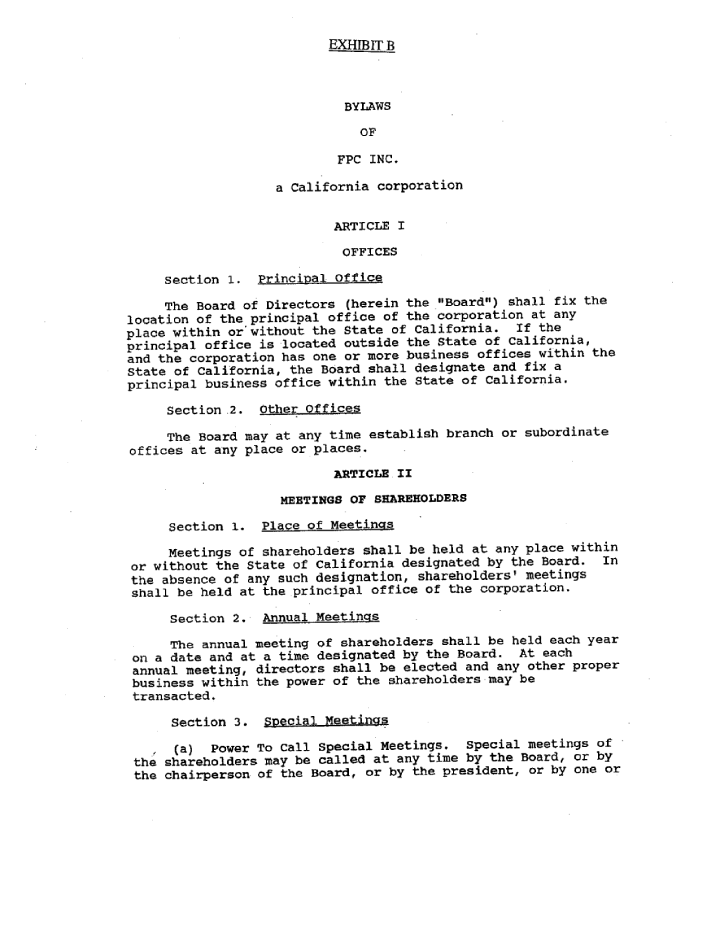
| Exhibit 3.2.5 EXHIBIT B BYLAWS OF FPC INC. a California corporation ARTICLE I OFFICES Section 1. Principal office The Board of Directors (herein the “Board”) shall fix the location of the principal office of the corporation at any place within or’without the State of California. If the principal office is located outside the State of California, and the corporation has one or more business offices within the State of California, the Board shall designate and fix a principal business office within the State of California. Section 2. Other Offices The Board may at any time establish branch or subordinate offices at any place or places. ARTICLE II MEETINGS OF SHAREHOLDERS Section 1. Place of Meetings Meetings of shareholders shall be held at any place within or without the State of California designated by the Board. In the absence of any such designation, shareholders’ meetings shall be held at the principal office of the corporation. Section 2, Annual Meetings The annual meeting of shareholders shall be held each year on a date and at a time designated by the Board. At each annual meeting, directors shall be elected and any other proper business within the power of the shareholders may be transacted. Section 3. Special Meetings (a) Power To call Special Meetings. Special meetings of the shareholders may be called at any time by the Board, or by the chairperson of the Board, or by the president, or by one or |
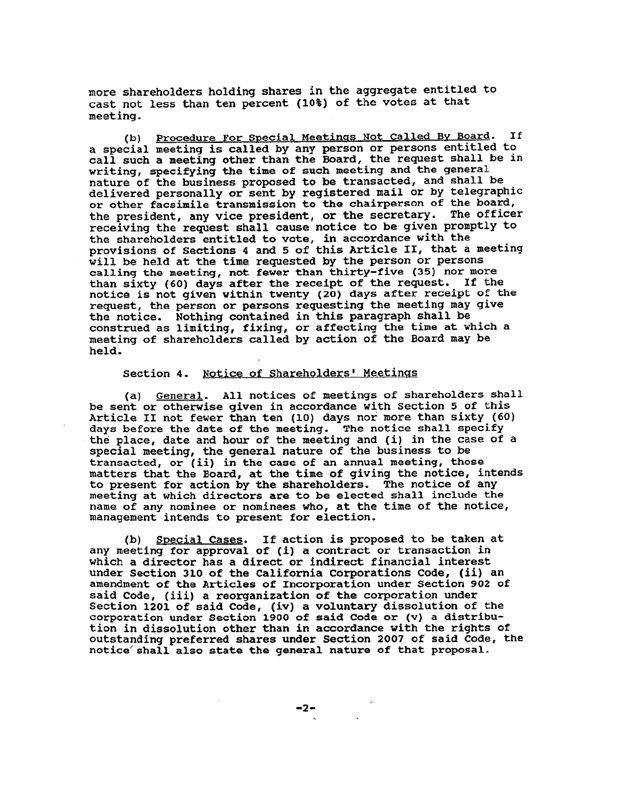
| more shareholders holding shares in the aggregate entitled to cast not less than ten percent (10%) of the votes at that meeting. (b) Procedure For Special Meetings Not Called By Board. If a special meeting is called by any person or persons entitled to call such a meeting other than the Board, the request shall be in writing, specifying the time of such meeting and the general nature of the business proposed to be transacted, and shall be delivered personally or sent by registered mail or by telegraphic or other facsimile transmission to the chairperson of the board, the president, any vice president, or the secretary. The officer receiving the request shall cause notice to be given promptly to the shareholders entitled to vote, in accordance with the provisions of Sections 4 and 5 of this Article II, that a meeting will be held at the time requested by the person or persons calling the meeting, not fewer than thirty-five (35) nor more than sixty (60) days after the receipt of the request. If the notice is not given within twenty (20) days after receipt of the request, the person or persons requesting the meeting may give the notice. Nothing contained in this paragraph shall be construed as limiting, fixing, or affecting the time at which a meeting of shareholders called by action of the Board may be held. Section 4. Notice of Shareholders’ Meetings (a)General. All notices of meetings of shareholders shall be sent or otherwise given in accordance with Section 5 of this Article II not fewer than ten (10) days nor more than sixty (60) days before the date of the meeting. The notice shall specify the place, date and hour of the meeting and (i) in the case of a special meeting, the general nature of the business to be transacted, or (ii) in the case of an annual meeting, those matters that the Board, at the time of giving the notice, intends to present for action by the shareholders. The notice of any meeting at which directors are to be elected shall include the name of any nominee or nominees who, at the time of the notice, management intends to present for election. (b)Special Cases. If action is proposed to be taken at any meeting for approval of (i) a contract or transaction in which a director has a direct or indirect financial interest under Section 310 of the California Corporations code, (ii) an amendment of the Articles of Incorporation under Section 902 of said Code, (iii) a reorganization of the corporation under Section 1201 of said Code, (iv) a voluntary dissolution of the corporation under Section 1900 of said Code or (v) a distribu tion in dissolution other than in accordance with the rights of outstanding preferred shares under Section 2007 of said Code, the notice’shall also state the general nature of that proposal. |
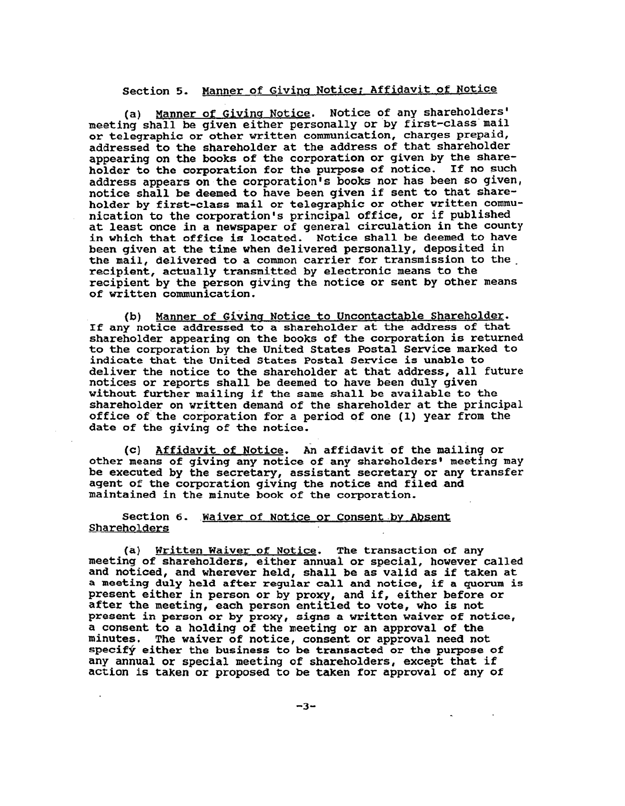
| Section 5. Manner of Giving Notice t Affidavit of Notice (a)Manner of Giving Notice. Notice of any shareholders’ meeting shall be given either personally or by first-class mail or telegraphic or other written communication, charges prepaid, addressed to the shareholder at the address of that shareholder appearing on the books of the corporation or given by the share holder to the corporation for the purpose of notice. If no such address appears on the corporation’s books nor has been so given, notice shall be deemed to have been given if sent to that share holder by first-class mail or telegraphic or other written commu nication to the corporation’s principal office, or if published at least once in a newspaper of general circulation in the county in which that office is located. Notice shall be deemed to have been given at the time when delivered personally, deposited in the mail, delivered to a common carrier for transmission to the . recipient, actually transmitted by electronic means to the recipient by the person giving the notice or sent by other means of written communication. (b)Manner of Giving Notice to Uncontactable Shareholder. If any notice addressed to a shareholder at the address of that shareholder appearing on the books of the corporation is returned to the corporation by the United States Postal Service marked to indicate that the United States Postal Service is unable to deliver the notice to the shareholder at that address, all future notices or reports shall be deemed to have been duly given without further mailing if the same shall be available to the shareholder on written demand of the shareholder at the principal office of the corporation for a period of one (1) year from the date of the giving of the notice. (cj Affidavit of Notice. An affidavit of the mailing or other means of giving any notice of any shareholders’ meeting may be executed by the secretary, assistant secretary or any transfer agent of the corporation giving the notice and filed and maintained in the minute book of the corporation. Section 6. waiver of Notice or Consent by Absent Shareholders (a) Written Waiver of Notice. The transaction of any meeting of shareholders, either annual or special, however called and noticed, and wherever held, shall be as valid as if taken at a meeting duly held after regular call and notice, if a quorum is present either in person or by proxy, and if, either before or after the meeting, each person entitled to vote, who is not present in person or by proxy, signs a written waiver of notice, a consent to a holding of the meeting or an approval of the minutes. The waiver of notice, consent or approval need not specify either the business to be transacted or the purpose of f ) any annual or special meeting of shareholders, except that if action is taken or proposed to be taken for approval of any of |
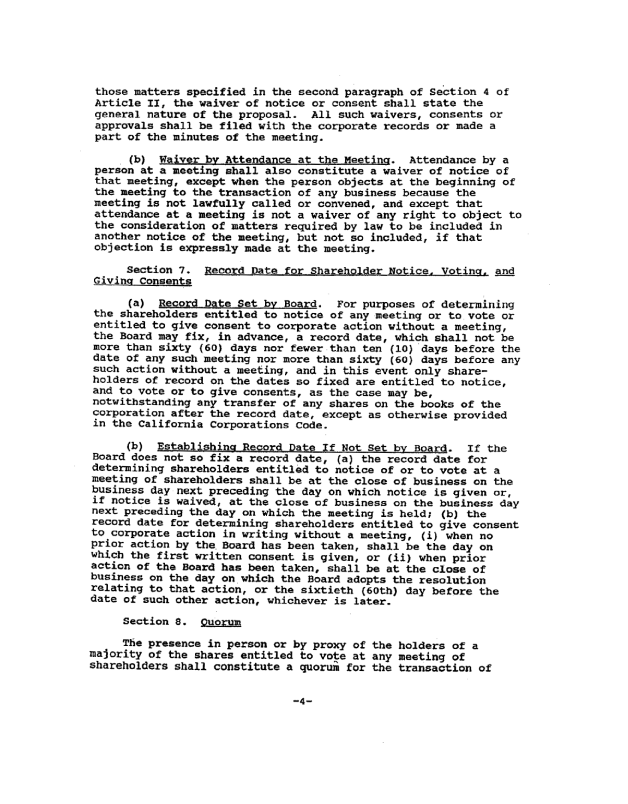
| those matters specified in the second paragraph of Section 4 of Article II, the waiver of notice or consent shall state the general nature of the proposal. All such waivers, consents or approvals shall be filed with the corporate records or made a part of the minutes of the meeting. (b) Waiver by Attendance at the Meeting. Attendance by a person at a meeting shall also constitute a waiver of notice of that meeting, except when the person objects at the beginning of the meeting to the transaction of any business because the meeting is not lawfully called or convened, and except that attendance at a meeting is not a waiver of any right to object to the consideration of matters required by law to be included in another notice of the meeting, but not so included, if that objection is expressly made at the meeting. Section 7. Record Date for Shareholder Notice. Voting, and Giving Consents (a)Record Date Set by Board. For purposes of determining the shareholders entitled to notice of any meeting or to vote or entitled to give consent to corporate action without a meeting, the Board may fix, in advance, a record date, which shall not be more than sixty (60) days nor fewer than ten (10) days before the date of any such meeting nor more than sixty (60) days before any such action without a meeting, and in this event only share holders of record on the dates so fixed are entitled to notice, and to vote or to give consents, as the case may be, notwithstanding any transfer of any shares on the books of the corporation after the record date, except as otherwise provided in the California Corporations code. (b)Establishing Record Date If Not Set by Board. If the Board does not so fix a record date, (a) the record date for determining shareholders entitled to notice of or to vote at a meeting of shareholders shall be at the close of business on the business day next preceding the day on which notice is given or, if notice is waived, at the close of business on the business day next preceding the day on which the meeting is held; (b) the record date for determining shareholders entitled to give consent to corporate action in writing without a meeting, (i) when no prior action by the Board has been taken, shall be the day on which the first written consent is given, or (ii) when prior action of the Board has been taken, shall be at the close of business on the day on which the Board adopts the resolution relating to that action, or the sixtieth (60th) day before the date of such other action, whichever is later. Section 8. Quorum The presence in person or by proxy of the holders of a majority of the shares entitled to vote at any meeting of shareholders shall constitute a quorum for the transaction of -4- |
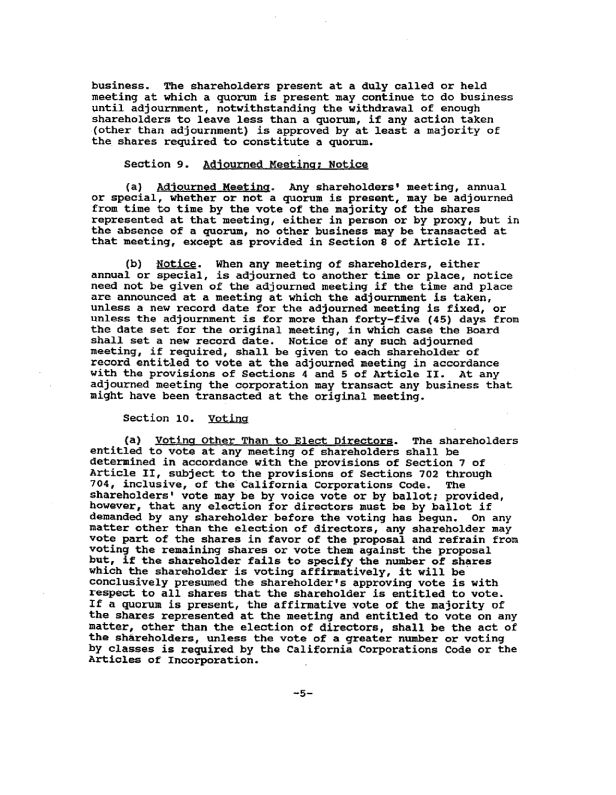
| business. The shareholders present at a duly called or held meeting at which a quorum is present may continue to do business until adjournment, notwithstanding the withdrawal of enough shareholders to leave less than a quorum, if any action taken (other than adjournment) is approved by at least a majority of the shares required to constitute a quorum. Section 9. Adjourned Meeting; Notice (a)Adlourned Meeting. Any shareholders’ meeting, annual or special, whether or not a quorum is present, nay be adjourned from time to time by the vote of the majority of the shares represented at that meeting, either in person or by proxy, but in the absence of a quorum, no other business may be transacted at that meeting, except as provided in Section 8 of Article II. (b)Notice. When any meeting of shareholders, either annual or special, is adjourned to another time or place, notice need not be given of the adjourned meeting if the time and place are announced at a meeting at which the adjournment is taken, unless a new record date for the adjourned meeting is fixed, or unless the adjournment is for more than forty-five (45) days from the date set for the original meeting, in which case the Board shall set a new record date. Notice of any such adjourned meeting, if required, shall be given to each shareholder of record entitled to vote at the adjourned meeting in accordance with the provisions of Sections 4 and 5 of Article II. At any adjourned meeting the corporation may transact any business that might have been transacted at the original meeting. Section 10. Voting (a) voting other Than to Elect Directors. The shareholders entitled to vote at any meeting of shareholders shall be determined in accordance with the provisions of Section 7 of Article II, subject to the provisions of Sections 702 through 704, inclusive, of the California Corporations Code. The shareholders’ vote may be by voice vote or by ballot; provided, however, that any election for directors must be by ballot if demanded by any shareholder before the voting has begun. On any matter other than the election of directors, any shareholder may vote part of the shares in favor of the proposal and refrain from voting the remaining shares or vote them against the proposal but, if the shareholder fails to specify the number of shares which the shareholder is voting affirmatively, it will be conclusively presumed the shareholder’s approving vote is with respect to all shares that the shareholder is entitled to vote. If a quorum is present, the affirmative vote of the majority of the shares represented at the meeting and entitled to vote on any matter, other than the election of directors, shall be the act of the shareholders, unless the vote of a greater number or voting by classes is required by the California Corporations Code or the Articles of Incorporation. |
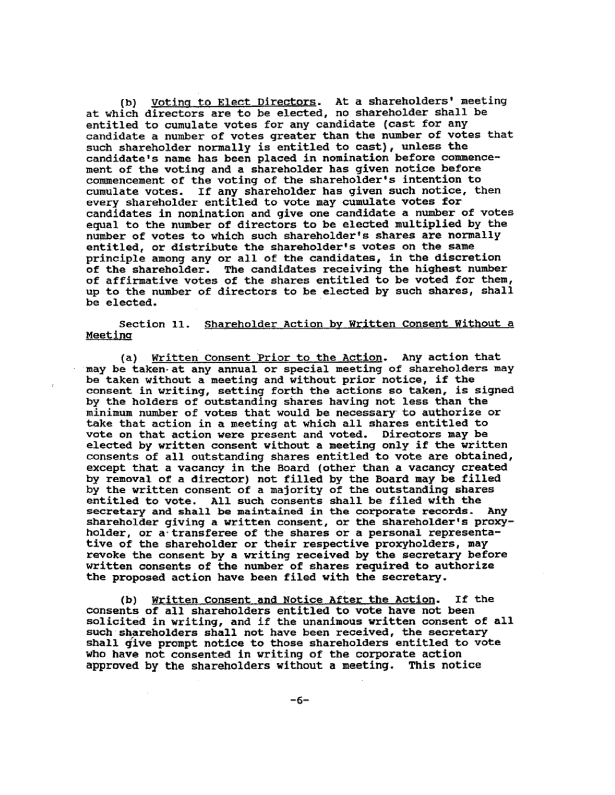
| (b) Voting to Elect Directors. At a shareholders’ meeting at which directors are to be elected, no shareholder shall be entitled to cumulate votes for any candidate (cast for any candidate a number of votes greater than the number of votes that such shareholder normally is entitled to cast), unless the candidate’s name has been placed in nomination before commencement of the voting and a shareholder has given notice before commencement of the voting of the shareholder’s intention to cumulate votes. If any shareholder has given such notice, then every shareholder entitled to vote may cumulate votes for candidates in nomination and give one candidate a number of votes equal to the number of directors to be elected multiplied by the number of votes to which such shareholder’s shares are normally entitled, or distribute the shareholder’s votes on the same principle among any or all of the candidates, in the discretion of the shareholder. The candidates receiving the highest number of affirmative votes of the shares entitled to be voted for them, up to the number of directors to be elected by such shares, shall be elected. Section 11. Shareholder Action by Written Consent Without a Meeting (a)Written Consent Prior to the Action. Any action that may be taken- at any annual or special meeting of shareholders may be taken without a meeting and without prior notice, if the consent in writing, setting forth the actions so taken, is signed by the holders of outstanding shares having not less than the minimum number of votes that would be necessary to authorize or take that action in a meeting at which all shares entitled to vote on that action were present and voted. Directors may be elected by written consent without a meeting only if the written consents of all outstanding shares entitled to vote are obtained, except that a vacancy in the Board (other than a vacancy created by removal of a director) not filled by the Board may be filled by the written consent of a majority of the outstanding shares entitled to vote. All such consents shall be filed with the secretary and shall be maintained in the corporate records. Any shareholder giving a written consent, or the shareholder’s proxy- holder, or a-transferee of the shares or a personal representa tive of the shareholder or their respective proxyholders, may revoke the consent by a writing received by the secretary before written consents of the number of shares required to authorize the proposed action have been filed with the secretary. (b)Written Consent and Notice After the Action. If the consents of all shareholders entitled to vote have not been solicited in writing, and if the unanimous written consent of all such shareholders shall not have been received, the secretary shall give prompt notice to those shareholders entitled to vote } who have not consented in writing of the corporate action * approved by the shareholders without a meeting. This notice |

| shall be given in the manner specified in Section 5 of Article II. In the case of approval of (i) contracts or transactions in which a director has a direct or indirect financial interest under Section 310 of the California Corporations Code, (ii) indemnification of agents of the corporation under Section 317 of said Code, (iii) a reorganization of the corporation under Section 1201 of said Code, or (iv) the distribution and dissolution other than in accordance with the rights of outstanding preferred shares under Section 2007 of said Code, the notice shall be given at least ten (10) days before the consummation of any action authorized by that approval. Section 12. Proxies Every person entitled to vote for directors or on any other matter shall have the right to do so either in person or by one or more agents authorized by written proxy signed by the person and filed with the secretary. A proxy shall be deemed signed if the shareholder’s name is placed on the proxy, whether by manual signature, typewriting, telegraphic transmission or otherwise, by the shareholder or shareholder’s attorney in fact. A validly executed proxy that does not state that it is irrevocable shall continue in full force and effect unless (i) revoked by the person executing it, before the vote pursuant to that proxy, by a writing delivered to the corporation stating that the proxy is revoked, or by a subsequent proxy executed by, or attendance at the meeting and voting in person by, the person executing the proxy; or (ii) written notice of the death or incapacity of the maker of that proxy is received by the corporation before the vote pursuant to that proxy is counted; provided, however, that no proxy shall be valid after the expiration of eleven (11) months from the date of the proxy, unless otherwise provided in the proxy. The revocability of a proxy that states on its face that it is irrevocable shall be governed by the provisions of Sections 705(e) and 705(f) of the California Corporations Code. Section 13. Inspectors of Election Before any meeting of shareholders, the Board may appoint any persons other than the nominees for office to act as inspectors of election at the meeting or its adjournment. If no inspectors of election are so appointed, the chairperson of the meeting may, and on the request of any shareholder or shareholder’s proxy shall, appoint inspectors of election at the meeting. The number of inspectors shall be either one (1) or three (3). If inspectors of election are appointed at a meeting on the request of one or more shareholders or proxies, the holders of a majority of the shares or their proxies present at the meeting shall determine whether one or three inspectors of election are to be appointed. The powers and duties of the inspectors of election shall be as prescribed by the California Corporations Code. |
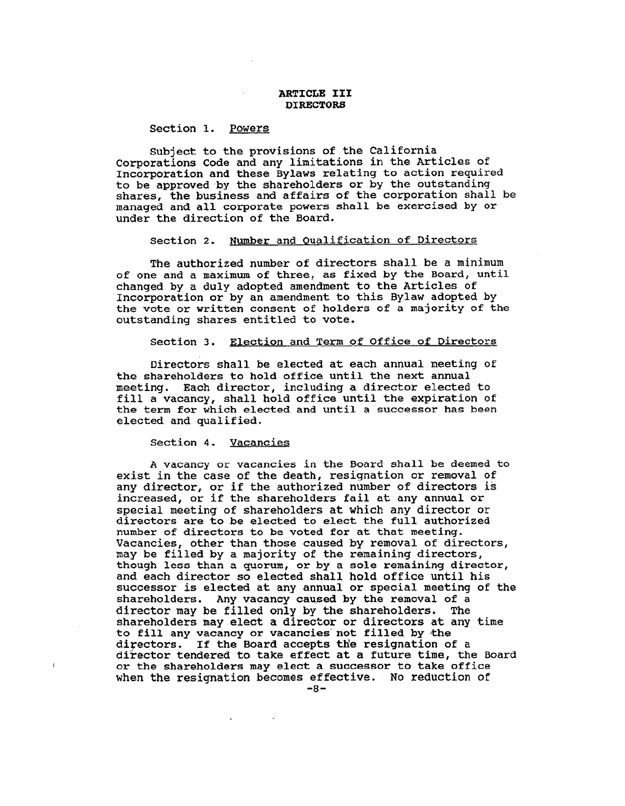
| ARTICLE III DIRECTORS Section 1. powers Subject to the provisions of the California Corporations Code and any limitations in the Articles of Incorporation and these Bylaws relating to action required to be approved by the shareholders or by the outstanding shares, the business and affairs of the corporation shall be managed and all corporate powers shall be exercised by or under the direction of the Board. Section 2. Number and Qualification of Directors The authorized number of directors shall be a minimum of one and a maximum of three, as fixed by the Board, until changed by a duly adopted amendment to the Articles of Incorporation or by an amendment to this Bylaw adopted by the vote or written consent of holders of a majority of the outstanding shares entitled to vote. Section 3. Election and Term of Office of Directors Directors shall be elected at each annual meeting of the shareholders to hold office until the next annual meeting. Each director, including a director elected to fill a vacancy, shall hold office until the expiration of the term for which elected and until a successor has been elected and qualified. Section 4. Vacancies A vacancy or vacancies in the Board shall be deemed to exist in the case of the death, resignation or removal of any director, or if the authorized number of directors is increased, or if the shareholders fail at any annual or special meeting of shareholders at which any director or directors are to be elected to elect the full authorized number of directors to be voted for at that meeting. Vacancies, other than those caused by removal of directors, may be filled by a majority of the remaining directors, though less than a quorum, or by a sole remaining director, and each director so elected shall hold office until his successor is elected at any annual or special meeting of the shareholders. Any vacancy caused by the removal of a director may be filled only by the shareholders. The shareholders may elect a director or directors at any time to fill any vacancy or vacancies not filled by the directors. If the Board accepts the resignation of a director tendered to take effect at a future time, the Board ) or the shareholders may elect a successor to take office when the resignation becomes effective. No reduction of ~S.CONT |
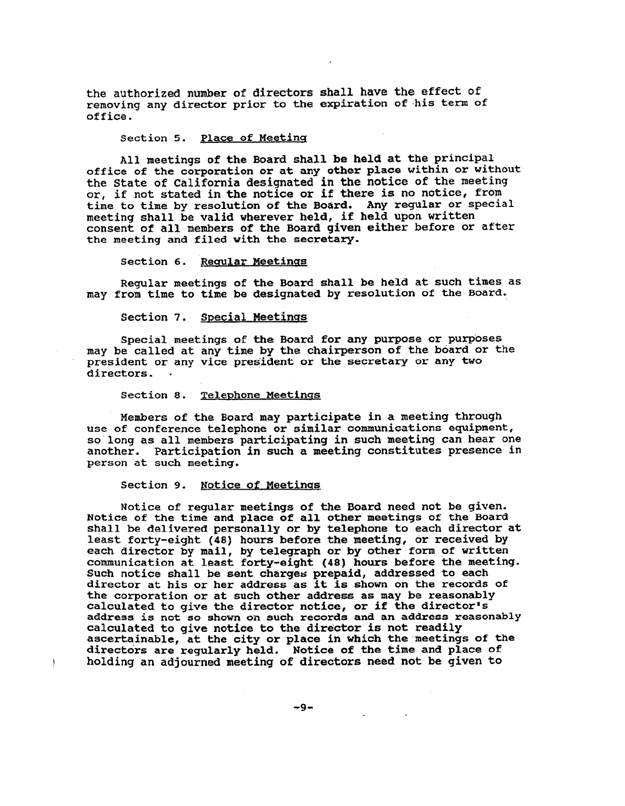
| the authorized number of directors shall have the effect of removing any director prior to the expiration of his term of office. Section 5. Place of Meeting All meetings of the Board shall be held at the principal office of the corporation or at any other place within or without the State of California designated in the notice of the meeting or, if not stated in the notice or if there is no notice, from time to time by resolution of the Board. Any regular or special meeting shall be valid wherever held, if held upon written consent of all members of the Board given either before or after the meeting and filed with the secretary. Section 6. Regular Meetings Regular meetings of the Board shall be held at such times as may from time to time be designated by resolution of the Board. Section 7. Special Meetings Special meetings of the Board for any purpose or purposes may be called at any time by the chairperson of the board or the president or any vice president or the secretary or any two directors. Section 8. Telephone Meetings Members of the Board may participate in a meeting through use of conference telephone or similar communications equipment, so long as all members participating in such meeting can hear one another. Participation in such a meeting constitutes presence in person at such meeting. Section 9. Notice of Meetings Notice of regular meetings of the Board need not be given. Notice of the time and place of all other meetings of the Board shall be delivered personally or by telephone to each director at least forty-eight (48) hours before the meeting, or received by each director by mail, by telegraph or by other form of written communication at least forty-eight (48) hours before the meeting. Such notice shall be sent charges prepaid, addressed to each director at his or her address as it is shown on the records of the corporation or at such other address as may be reasonably calculated to give the director notice, or if the director’s address is not so shown on such records and an address reasonably calculated to give notice to the director is not readily ascertainable, at the city or place in which the meetings of the directors are regularly held. Notice of the time and place of holding an adjourned meeting of directors need not be given to |
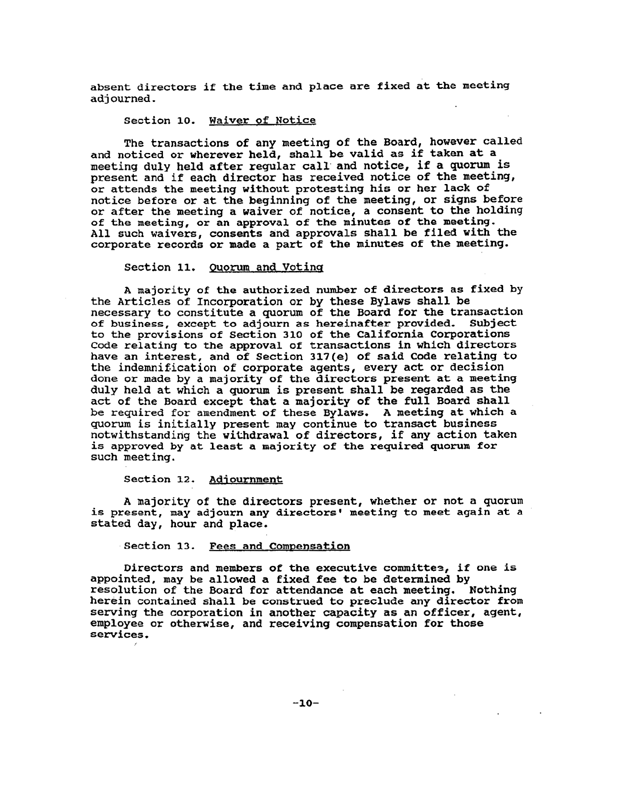
| absent directors if the time and place are fixed at the meeting adjourned. Section 10. Waiver of Notice The transactions of any meeting of the Board, however called and noticed or wherever held, shall be valid as if taken at a meeting duly held after regular call and notice, if a quorum is present and if each director has received notice of the meeting, or attends the meeting without protesting his or her lack of notice before or at the beginning of the meeting, or signs before or after the meeting a waiver of notice, a consent to the holding of the meeting, or an approval of the minutes of the meeting. All such waivers, consents and approvals shall be filed with the corporate records or made a part of the minutes of the meeting. Section 11. Quorum and Voting A majority of the authorized number of directors as fixed by the Articles of Incorporation or by these Bylaws shall be necessary to constitute a quorum of the Board for the transaction of business, except to adjourn as hereinafter provided. Subject to the provisions of Section 310 of the California Corporations Code relating to the approval of transactions in which directors have an interest, and of Section 317(e) of said Code relating to the indemnification of corporate agents, every act or decision done or made by a majority of the directors present at a meeting duly held at which a quorum is present shall be regarded as the act of the Board except that a majority of the full Board shall be required for amendment of these Bylaws. A meeting at which a quorum is initially present may continue to transact business notwithstanding the withdrawal of directors, if any action taken is approved by at least a majority of the required quorum for such meeting. Section 12. Adjournment A majority of the directors present, whether or not a quorum is present, may adjourn any directors’ meeting to meet again at a stated day, hour and place. Section 13. Fees and Compensation Directors and members of the executive committee, if one is appointed, may be allowed a fixed fee to be determined by resolution of the Board for attendance at each meeting. Nothing herein contained shall be construed to preclude any director from serving the corporation in another capacity as an officer, agent, employee or otherwise, and receiving compensation for those services. |
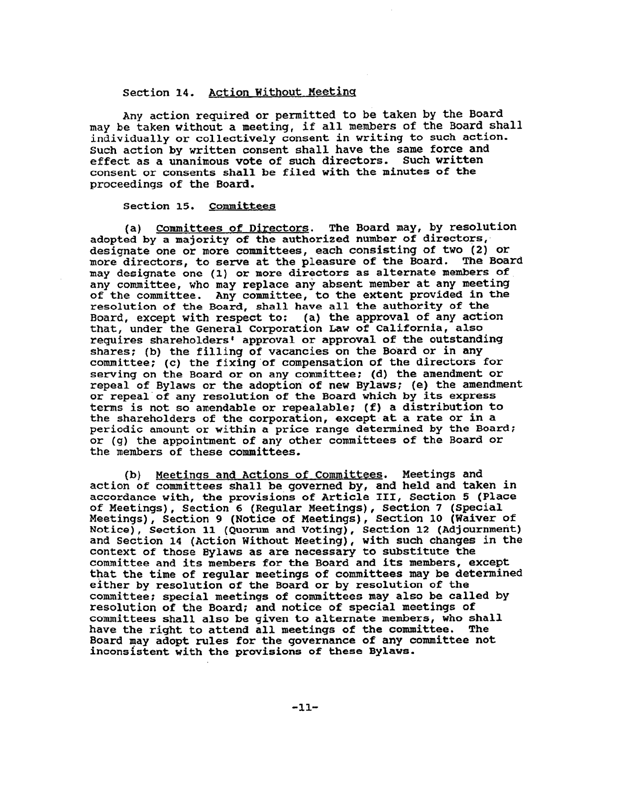
| Section 14. Action Without Meeting Any action required or permitted to be taken by the Board may be taken without a meeting, if all members of the Board shall individually or collectively consent in writing to such action. Such action by written consent shall have the same force and effect as a unanimous vote of such directors. Such written consent or consents shall be filed with the minutes of the proceedings of the Board. Section 15. Committees (a) Committees of Directors. The Board may, by resolution adopted by a majority of the authorized number of directors, designate one or more committees, each consisting of two (2) or more directors, to serve at the pleasure of the Board. The Board may designate one (1) or more directors as alternate members of any committee, who may replace any absent member at any meeting of the committee. Any committee, to the extent provided in the resolution of the Board, shall have all the authority of the Board, except with respect to: (a) the approval of any action that, under the General Corporation Law of California, also requires shareholders’ approval or approval of the outstanding shares; (b) the filling of vacancies on the Board or in any committee; (c) the fixing of compensation of the directors for serving on the Board or on any committee; (d) the amendment or repeal of Bylaws or the adoption of new Bylaws; (e) the amendment or repeal of any resolution of the Board which by its express terms is not so amendable or repealable; (f) a distribution to the shareholders of the corporation, except at a rate or in a periodic amount or within a price range determined by the Board; or (g) the appointment of any other committees of the Board or the members of these committees. (b) Meetings and Actions of Committees. Meetings and action of committees shall be governed by, and held and taken in accordance with, the provisions of Article III, Section 5 (Place of Meetings), Section 6 (Regular Meetings), section 7 (special Meetings), Section 9 (Notice of Meetings), Section 10 (Waiver of Notice), section 11 (Quorum and Voting), Section 12 (Adjournment) and Section 14 (Action Without Meeting), with such changes in the context of those Bylaws as are necessary to substitute the committee and its members for the Board and its members, except that the time of regular meetings of committees may be determined either by resolution of the Board or by resolution of the committee; special meetings of committees may also be called by resolution of the Board; and notice of special meetings of committees shall also be given to alternate members, who shall have the right to attend all meetings of the committee. The Board may adopt rules for the governance of any committee not inconsistent with the provisions of these Bylaws. (a) |
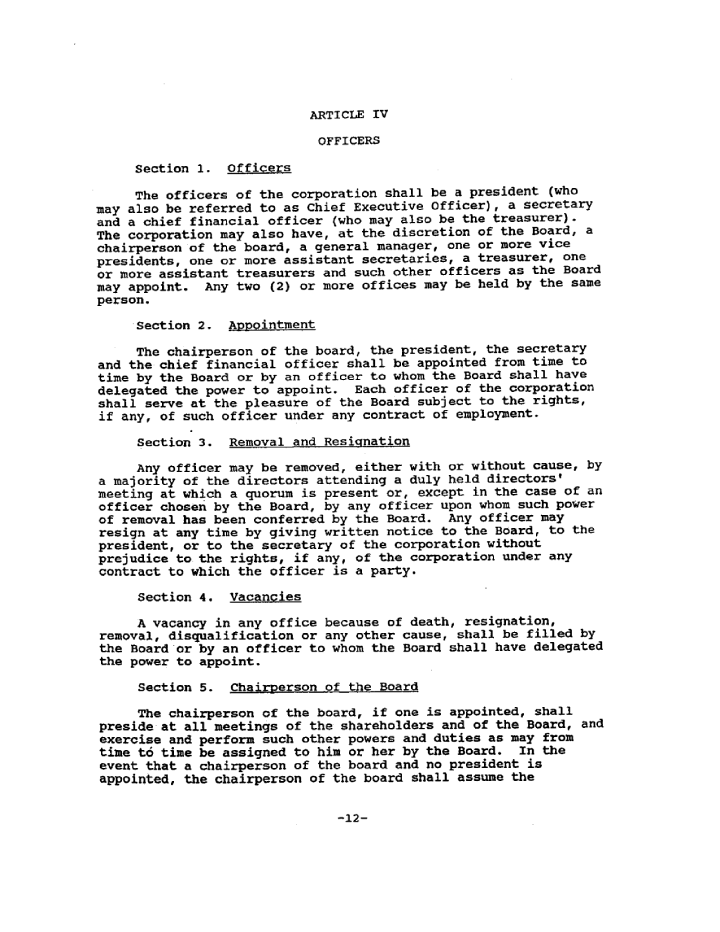
| ARTICLE IV OFFICERS Section 1. officers The officers of the corporation shall be a president (who may also be referred to as chief Executive Officer), a secretary and a chief financial officer (who may also be the treasurer). The corporation may also have, at the discretion of the Board, a chairperson of the board, a general manager, one or more vice presidents, one or more assistant secretaries, a treasurer, one f or more assistant treasurers and such other officers as the Board may appoint. Any two (2) or more offices may be held by the same person. Section 2. Appointment The chairperson of the board, the president, the secretary and the chief financial officer shall be appointed from time to time by the Board or by an officer to whom the Board shall have delegated the power to appoint. Each officer of the corporation shall serve at the pleasure of the Board subject to the rights, if any, of such officer under any contract of employment. Section 3. Removal and Resignation Any officer may be removed, either with or without cause, by a majority of the directors attending a duly held directors’ meeting at which a quorum is present or, except in the case of an officer chosen by the Board, by any officer upon whom such power of removal has been conferred by the Board. Any officer may resign at any time by giving written notice to the Board, to the president, or to the secretary of the corporation without prejudice to the rights, if any, of the corporation under any contract to which the officer is a party. Section 4. Vacancies A vacancy in any office because of death, resignation, removal, disqualification or any other cause, shall be filled by the Board or by an officer to whom the Board shall have delegated the power to appoint. Section 5. Chairperson of the Board The chairperson of the board, if one is appointed, shall preside at all meetings of the shareholders and of the Board, and exercise and perform such other powers and duties as may from time to time be assigned to him or her by the Board. In the event that a chairperson of the board and no president is appointed, the chairperson of the board shall assume the |
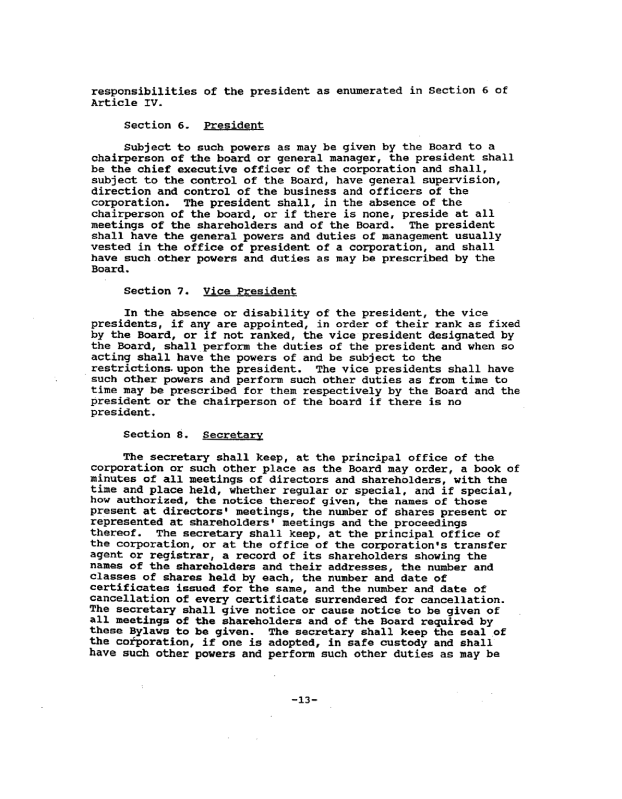
| responsibilities of the president as enumerated in Section 6 of Article IV. Section 6. President Subject to such powers as may be given by the Board to a chairperson of the board or general manager, the president shall be the chief executive officer of the corporation and shall, subject to the control of the Board, have general supervision, direction and control of the business and officers of the corporation. The president shall, in the absence of the chairperson of the board, or if there is none, preside at all meetings of the shareholders and of the Board. The president shall have the general powers and duties of management usually vested in the office of president of a corporation, and shall have such other powers and duties as may be prescribed by the Board. Section 7. Vice President In the absence or disability of the president, the vice presidents, if any are appointed, in order of their rank as fixed by the Board, or if not ranked, the vice president designated by the Board, shall perform the duties of the president and when so acting shall have the powers of and be subject to the restrictions, upon the president. The vice presidents shall have such other powers and perform such other duties as from time to time may be prescribed for them respectively by the Board and the president or the chairperson of the board if there is no president. Section 8. Secretary The secretary shall keep, at the principal office of the corporation or such other place as the Board may order, a book of minutes of all meetings of directors and shareholders, with the time and place held, whether regular or special, and if special, how authorized, the notice thereof given, the names of those present at directors’ meetings, the number of shares present or represented at shareholders’ meetings and the proceedings thereof. The secretary shall keep, at the principal office of the corporation, or at the office of the corporation’s transfer agent or registrar, a record of its shareholders showing the names of the shareholders and their addresses, the number and classes of shares held by each, the number and date of certificates issued for the same, and the number and date of cancellation of every certificate surrendered for cancellation. The secretary shall give notice or cause notice to be given of all meetings of the shareholders and of the Board required by these Bylaws to be given. The secretary shall keep the seal of the corporation, if one is adopted, in safe custody and shall have such other powers and perform such other duties as may be |
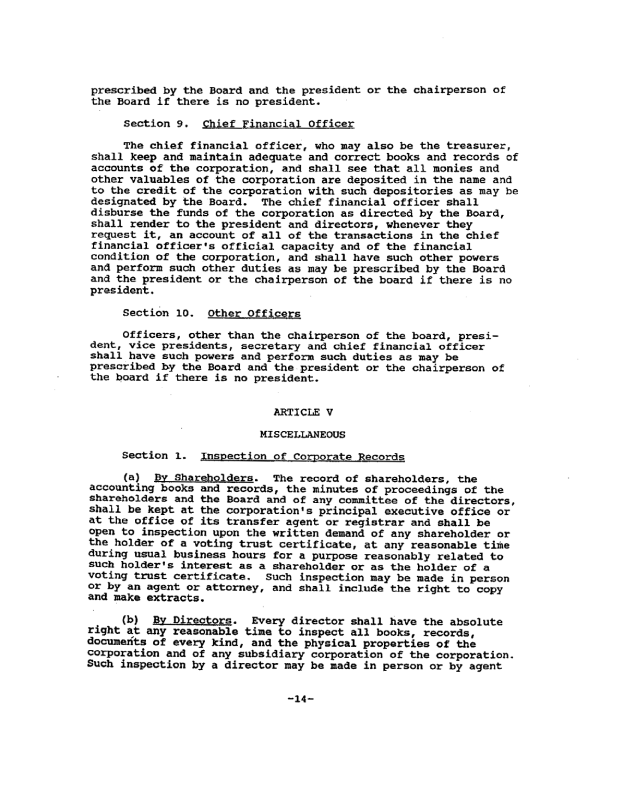
| prescribed by the Board and the president or the chairperson of the Board if there is no president. Section 9. Chief Financial Officer The chief financial officer, who may also be the treasurer, shall keep and maintain adequate and correct books and records of accounts of the corporation, and shall see that all monies and other valuables of the corporation are deposited in the name and to the credit of the corporation with such depositories as may be designated by the Board. The chief financial officer shall disburse the funds of the corporation as directed by the Board, shall render to the president and directors, whenever they request it, an account of all of the transactions in the chief financial officer’s official capacity and of the financial condition of the corporation, and shall have such other powers and perform such other duties as may be prescribed by the Board and the president or the chairperson of the board if there is no president. Section 10. Other officers Officers, other than the chairperson of the board, president, vice presidents, secretary and chief financial officer shall have such powers and perform such duties as nay be prescribed by the Board and the president or the chairperson of the board if there is no president. ARTICLE V MISCELLANEOUS Section 1. Inspection of Corporate Records (a) By Shareholders. The record of shareholders, the accounting books and records, the minutes of proceedings of the shareholders and the Board and of any committee of the directors, shall be kept at the corporation’s principal executive office or at the office of its transfer agent or registrar and shall be open to inspection upon the written demand of any shareholder or the holder of a voting trust certificate, at any reasonable time during usual business hours for a purpose reasonably related to such holder’s interest as a shareholder or as the holder of a voting trust certificate, such inspection may be made in person or by an agent or attorney, and shall include the right to copy and make extracts. (b) By Directors. Every director shall have the absolute right at any reasonable time to inspect all books, records, documents of every kind, and the physical properties of the corporation and of any subsidiary corporation of the corporation. Such inspection by a director may be made in person or by agent (a) |
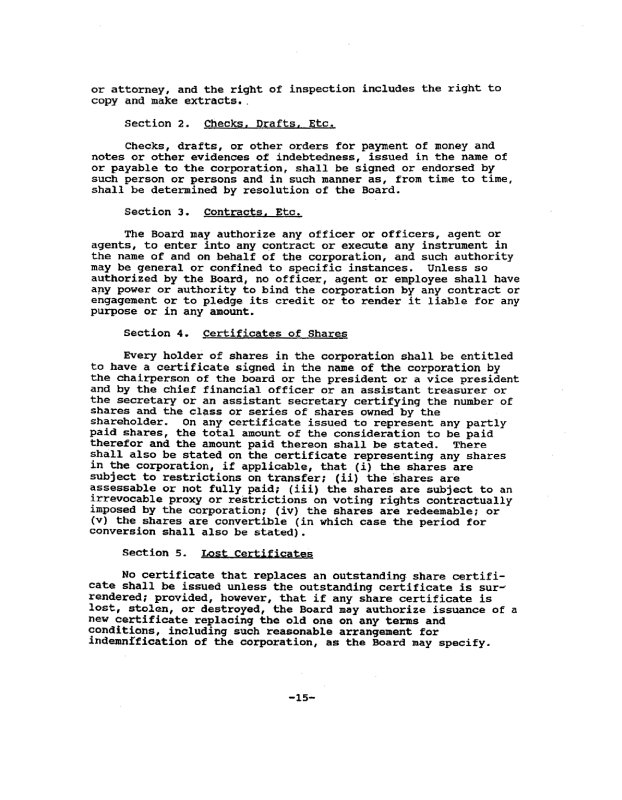
| or attorney, and the right of inspection includes the right to copy and make extracts. Section 2. Checks, Drafts, Etc. Checks, drafts, or other orders for payment of money and notes or other evidences of indebtedness, issued in the name of or payable to the corporation, shall be signed or endorsed by such person or persons and in such manner as, from time to time, shall be determined by resolution of the Board. Section 3. Contracts, Etc. The Board may authorize any officer or officers, agent or agents, to enter into any contract or execute any instrument in the name of and on behalf of the corporation, and such authority may be general or confined to specific instances. Unless so authorized by the Board, no officer, agent or employee shall have any power or authority to bind the corporation by any contract or engagement or to pledge its credit or to render it liable for any purpose or in any amount. Section 4. Certificates of Shares Every holder of shares in the corporation shall be entitled to have a certificate signed in the name of the corporation by the chairperson of the board or the president or a vice president and by the chief financial officer or an assistant treasurer or the secretary or an assistant secretary certifying the number of shares and the class or series of shares owned by the shareholder. on any certificate issued to represent any partly paid shares, the total amount of the consideration to be paid therefor and the amount paid thereon shall be stated. There shall also be stated on the certificate representing any shares in the corporation, if applicable, that (i) the shares are subject to restrictions on transfer; (ii) the shares are assessable or not fully paid; (iii) the shares are subject to an irrevocable proxy or restrictions on voting rights contractually imposed by the corporation; (iv) the shares are redeemable; or (v) the shares are convertible (in which case the period for conversion shall also be stated). Section 5. Lost Certificates No certificate that replaces an outstanding share certificate shall be issued unless the outstanding certificate is sur-rendered; provided, however, that if any share certificate is lost, stolen, or destroyed, the Board may authorize issuance of a new certificate replacing the old one on any terms and conditions, including such reasonable arrangement for indemnification of the corporation, as the Board nay specify. |
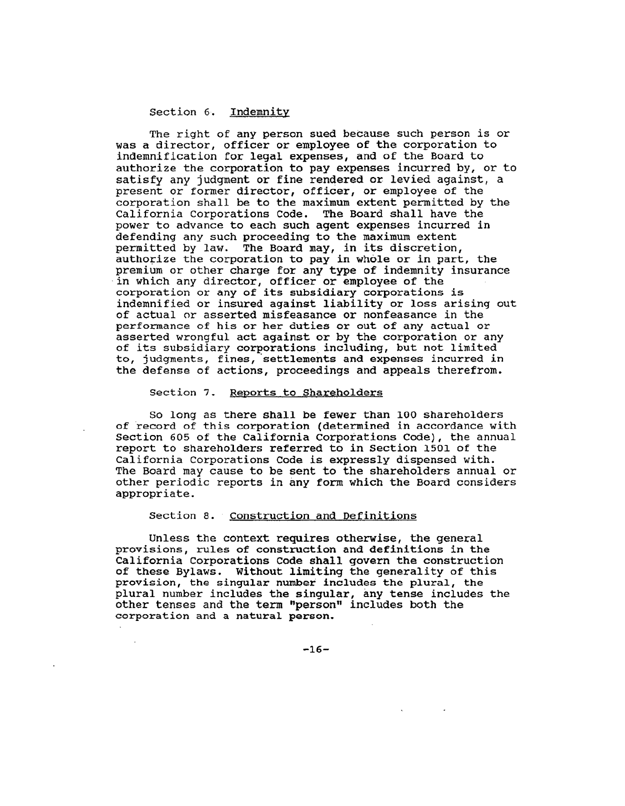
| Section 6. Indemnity The right of any person sued because such person is or was a director, officer or employee of the corporation to indemnification for legal expenses, and of the Board to authorize the corporation to pay expenses incurred by, or to satisfy any judgment or fine rendered or levied against, a present or former director, officer, or employee of the corporation shall be to the maximum extent permitted by the California Corporations Code. The Board shall have the power to advance to each such agent expenses incurred in defending any such proceeding to the maximum extent permitted by law. The Board may, in its discretion, authorize the corporation to pay in whole or in part, the premium or other charge for any type of indemnity insurance in which any director, officer or employee of the corporation or any of its subsidiary corporations is indemnified or insured against liability or loss arising out of actual or asserted misfeasance or nonfeasance in the performance of his or her duties or out of any actual or asserted wrongful act against or by the corporation or any of its subsidiary corporations including, but not limited to, judgments, fines, settlements and expenses incurred in the defense of actions, proceedings and appeals therefrom. Section 7. Reports to Shareholders So long as there shall be fewer than 100 shareholders of record of this corporation (determined in accordance with Section 605 of the California Corporations Code), the annual report to shareholders referred to in Section 1501 of the California Corporations Code is expressly dispensed with. The Board may cause to be sent to the shareholders annual or other periodic reports in any form which the Board considers appropriate. Section 8. Construction and Definitions Unless the context requires otherwise, the general provisions, rules of construction and definitions in the California Corporations Code shall govern the construction of these Bylaws. Without limiting the generality of this provision, the singular number includes the plural, the plural number includes the singular, any tense includes the other tenses and the term “person” includes both the corporation and a natural person. |
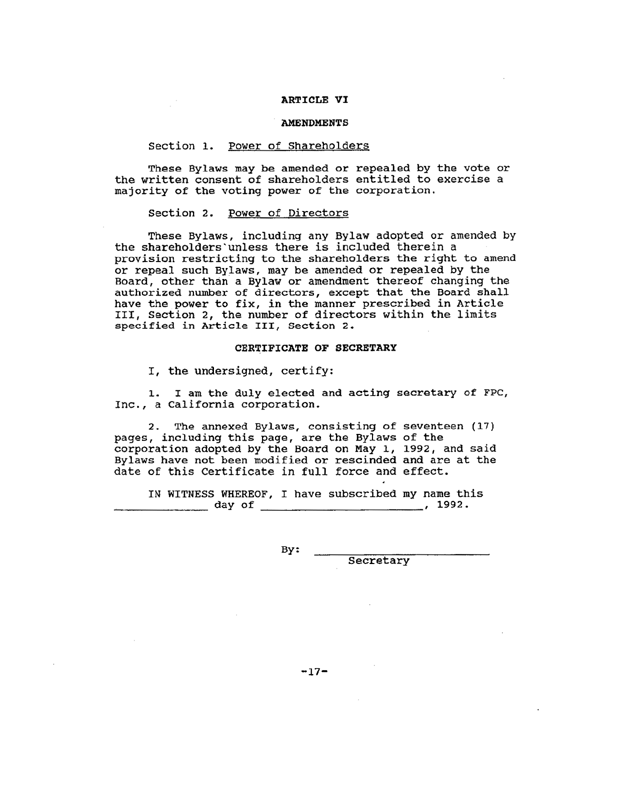
| ARTICLE VI AMENDMENTS Section 1. Power of Shareholders These Bylaws may be amended or repealed by the vote or the written consent of shareholders entitled to exercise a majority of the voting power of the corporation. Section 2. Power of Directors These Bylaws, including any Bylaw adopted or amended by the shareholders unless there is included therein a provision restricting to the shareholders the right to amend or repeal such Bylaws, may be amended or repealed by the Board, other than a Bylaw or amendment thereof changing the authorized number of directors, except that the Board shall have the power to fix, in the manner prescribed in Article III, Section 2, the number of directors within the limits specified in Article III, Section 2. CERTIFICATE OF SECRETARY I, the undersigned, certify: 1. I am the duly elected and acting secretary of fpc, Inc., a California corporation. 2. The annexed Bylaws, consisting of seventeen (17) pages, including this page, are the Bylaws of the corporation adopted by the Board on May 1, 1992, and said Bylaws have not been modified or rescinded and are at the date of this Certificate in full force and effect. IN WITNESS WHEREOF, I have subscribed ray name this day of , 1992. By: Secretary |